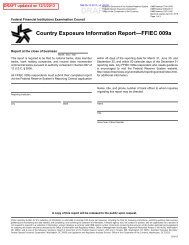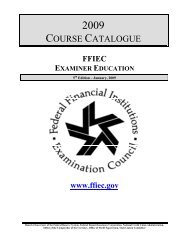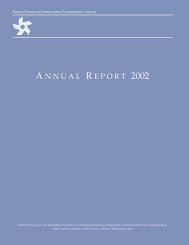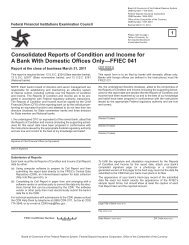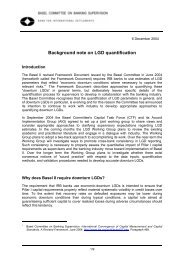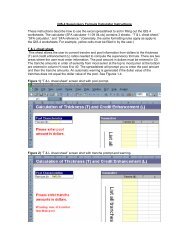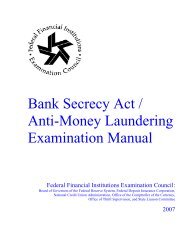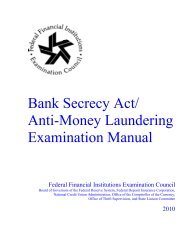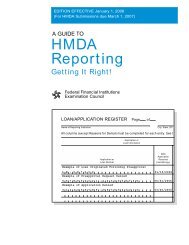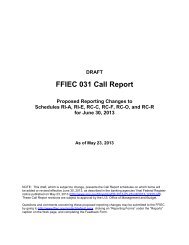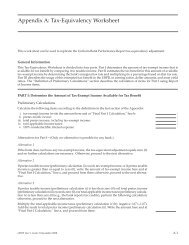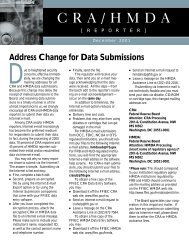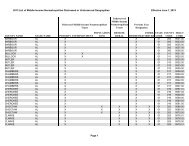FFIEC Annual Report 1999
FFIEC Annual Report 1999
FFIEC Annual Report 1999
Create successful ePaper yourself
Turn your PDF publications into a flip-book with our unique Google optimized e-Paper software.
ACTIVITIES OF THE INTERAGENCY STAFF GROUPS<br />
Section 1006 of Public Law 95–630<br />
sets forth the functions of the Council.<br />
Briefly summarized, these functions<br />
are the following:<br />
establish uniform principles, standards,<br />
and report forms for the<br />
examination of financial institutions<br />
and make recommendations<br />
for uniformity in other supervisory<br />
matters<br />
develop uniform reporting systems<br />
for federally supervised<br />
institutions, their holding companies,<br />
and subsidiaries of those<br />
institutions and holding<br />
companies<br />
conduct schools for examiners<br />
employed by the federal supervisory<br />
agencies and make those<br />
schools available to employees<br />
of state supervisory agencies<br />
under conditions specified by<br />
the Council.<br />
To effectively administer projects<br />
in all those functional areas, the<br />
Council established six interagency<br />
staff task forces, each of which<br />
includes one senior official from<br />
each agency:<br />
Consumer Compliance<br />
Examiner Education<br />
Information Sharing<br />
<strong>Report</strong>s<br />
Supervision<br />
Surveillance Systems.<br />
The Council also established the<br />
Legal Advisory Group, composed<br />
of a senior legal officer from each<br />
agency. The task forces and the<br />
Legal Advisory Group provide<br />
research and analytical papers and<br />
proposals on the issues that the<br />
Council addresses.<br />
Task Force on Consumer<br />
Compliance<br />
The Task Force on Consumer Compliance<br />
promotes policy coordination<br />
and uniform enforcement of<br />
consumer laws by the five agencies<br />
represented on the Council. It consists<br />
of senior personnel with knowledge<br />
of consumer compliance matters.<br />
The task force identifies and<br />
studies problems concerning consumer<br />
compliance and fosters uniformity<br />
in the policies and procedures<br />
used by member agencies.<br />
The task force is responsible for<br />
those laws and regulations that<br />
protect consumers who conduct<br />
business with insured depository<br />
institutions. The task force also<br />
addresses other legislation, regulations,<br />
or policies at the state and<br />
federal levels that could affect agencies’<br />
consumer compliance responsibilities.<br />
During <strong>1999</strong>, the task force<br />
had six standing subcommittees:<br />
Task Force on Consumer Compliance meeting.<br />
automation, Community Reinvestment<br />
Act, electronic banking, examination<br />
procedures, Home Mortgage<br />
Disclosure Act, and fair lending.<br />
Also, one issue-specific working<br />
groupworked on implementing an<br />
interagency consumer-contacts<br />
database.<br />
Automation Subcommittee<br />
The Automation Subcommittee provides<br />
the task force with technical<br />
support by undertaking projects<br />
that require coordination with other<br />
automation groups and by developing<br />
applications for <strong>FFIEC</strong> benefit.<br />
In <strong>1999</strong>, the subcommittee enhanced<br />
the <strong>FFIEC</strong> CRA Ratings database to<br />
synchronize agency updates to ensure<br />
reporting consistency. In 2000,<br />
the subcommittee plans to continue<br />
to enhance the <strong>FFIEC</strong> CRA ratings<br />
database in response to consumer<br />
and agency recommendations.<br />
11



